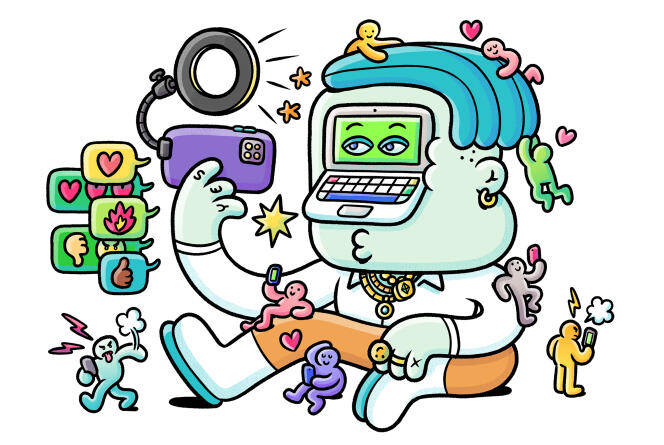


In the historic French mass rape trial, the image of Gisèle Pelicot, clad in dark glasses and a dignified air, will remain engraved in people's memories, as she has sought to turn the burden of shame back on the 51 men accused of aggravated rape against her. Yet also, in the social media content published since the high-profile case opened in September, the image of a simple purple disk: the ???? emoji.
A purple dot, used to replace the word "rape" ("viol" in French). More flashy than "vi0l" written with a zero, or "vi*l" with an asterisk, the ???? dot has the same function as the ???? emoji for English speakers (the word "grape," being close to the word "rape"): To circumvent possible "shadowban" censorship. "Shadowbanning" refers to allegations that social media platforms' algorithms or moderation teams would opaquely and unilaterally choose to make certain content invisible. As the word rape is often associated with cyber-violence or pornography online, social media users have come to believe that the platforms would tend to reduce the visibility of content that discusses it.
Of course, ???? (and to a lesser extent ????) can be found in videos and captions that predate this mass rape trial – the emoji itself was approved in 2019 by the Unicode Consortium, the non-profit organization that notably oversees emoji standards. Yet the trick spread far and wide, with the emoji having become a sort of symbol, allowing users to quickly identify French-speaking online spaces debating rape culture and sexual violence. Indeed, on certain days, the impact the Pélicot case had on society took the form of an eruption of purple dots.
@clemcopineduweb Par contre on sera là à la fin du procès ????✨| @Briseusedesortilèges pour republier les visuels #fyp #fypシ #foryou #mazan #affairemazan
♬ son original - Clem copine du web ????✨????
With platforms' detection systems being unable to distinguish the context in which a word is used, it has long been necessary to be inventive in using the lexical field of sexuality. In early September, the authors of the compilation book Gouines (a reappropriated term for "lesbians") published a redacted version of their book's cover on social media, featuring a more modest Gou*nes. "To avoid getting struck [banned] by Instagram's moderation, which obviously doesn't know the difference between an insult and the reappropriation of an insult," wrote one of them.
Social media platform users also deliberately slip misspellings into "seksual" words, which are censored by Silicon Valley's prudishness, which, in 2018, had even censored the bare breasts in Eugène Delacroix's famous painting, Liberty Leading the People.
Even so, the censorship still has to be real. So far, social media platforms have never admitted to resorting to shadowbanning, as culture magazine Telerama pointed out in December. Moreover, in the case of the Pélicot trial, it has to be said that a very large number of videos, notably from media outlets, such as those on Le Monde's TikTok account, explicitly state the word rape without being relegated to the hidden depths of the applications' archives. This at the very least suggests that the platforms treat videos on a case-by-case basis.
You have 43.44% of this article left to read. The rest is for subscribers only.
